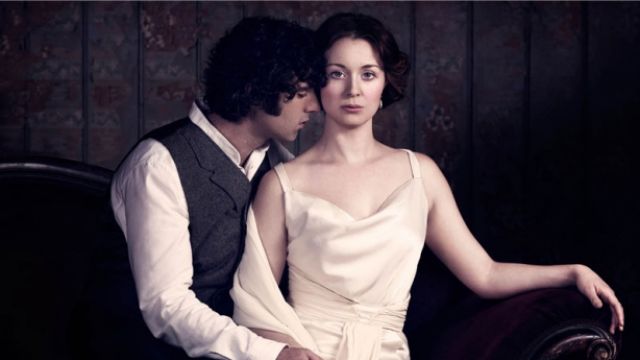Miss Julie
The wondrous thing about theatre, for myself and so many others, is that it is three dimensional, with the illusion of being “real” upon a stage, because the actors are flesh and blood, yet leaving room for us to create our own subtext alongside that of the writer’s. It is not film, or television, which have their own attributes but are, at the core, two dimensional.
So when the two dimensional element is all pervasive, and you put it on a large screen that swamps the three dimensional actors working in their glass box; and when you allow the audience to see those soft wheeled dolly cameras at work complete with cameramen in the darkness of the cavernous black maw which is the bulk of the Sumner theatre stage; and when you let the camera linger on minutiae which informs neither character nor narrative thrust (eg…a stack of plates, a sink, the back of a neck) then you run the risk of pulling focus from both play and performances and lulling your audience into believing they are in front of their tellies and can get up and make a cup of tea.
That was my over-riding feeling on the opening night of Miss Julie, long a favourite play. It was beautifully shot, but that’s hardly the point.
I could have stayed at home and watched it on the Arts channel. In fact I remember seeing a fabulous TV version with Patrick Malahide as Jean many years ago.
No doubt the brilliantly clever Kip Williams, one of our very best directors, had meticulously thought this through, and decided that this device (for that is really all it is) would create a new intimacy in a play which desperately needs it to work on all levels. We need to believe that Julie and Jean are driven by a power struggle fuelled by URST … yet we never felt it.
I have loved Strindberg all my life, but a world with a rigid class structure, which intrudes into, even governs, sexual taboos, no longer exists, and is no longer shocking to anyone. Adding a ‘fly on the wall’ element, much like a Home and Away episode, doesn’t modernise or expand the play, it simply diminishes it.

Strindberg’s dialogue (though ‘played’ with here in translation) was always naturalistic, often mundane, coming from character always, though juxtaposed against a much larger theme, expressed through subtext. Sometimes it seems obscure and irrelevant – like so much of early Pinter, but incredibly modern for it’s time. We understand that this sexual encounter between the young Mistress of the house and the lowly servant is doomed. They know it too; but passion, and the level of mutual contempt between the classes, makes it inevitable. Nevertheless, though people may despise each other, they are still compelled to engage in a battle of survival which neither can win. Making the performances ‘smaller’ to accommodate the ‘bigger’ world of the screen should work in theory. Yet, for the first 40 minutes there was no sense of tension or sexuality between the would-be lovers.
Mark Leonard Winter is a fine young actor; no-one could dispute that, yet he seemed to bring his B game to the opening night performance, often lacking in energy, and at one point seeming overly aware of the camera (along with most of us, I concede). The low-key element worked quite well if you only watched the screen, but, watching the stage, his lines often seemed delivered as disinterest. Where was the subtextual tension necessary for us to believe in Jean’s seduction?
Robin Mcleavy is an interesting actress and made Miss Julie into a flesh and blood three-dimensional woman able to incorporate her sexual needs into a much greater lust for power. One wonders at the history of her life and whether it was her mother or father, both equally destructive, who led her to a place of hurting others before they could hurt her. She also looks both earthy and etheric on film - but the ‘hopeful expectation’ of the final moments in her scene with Kristin (the always wonderful and compelling Zahra Newman) seemed out of kilter with everything that has gone before.
Alice Babidge’s set (and costumes) provide a masterful space suitably contained for a play involving the breaking down of walls and social mores. If only we couldn’t see those bloody cameras, constantly returning us to earth when we are almost transported. Paul Jackson’s lighting is quite wonderful, particularly when he uses key lights to combat, rather than succumb to, the film technique. Pete Goodwin (The Sweats) once again created an atmospheric underscore that helped drive the narrative, as a soundtrack does in a movie. Despite all the plusses, the whole performance was, for me, a noble failure. But I’d still rather have a noble failure than a mediocre success.
Coral Drouyn
Photographer: Jeff Busby.
Subscribe to our E-Newsletter, buy our latest print edition or find a Performing Arts book at Book Nook.

